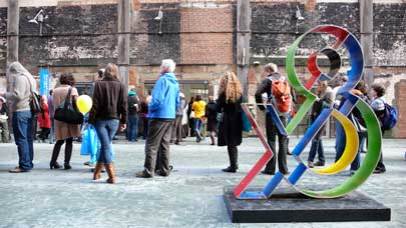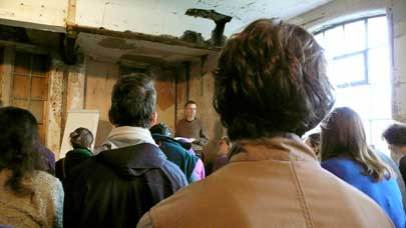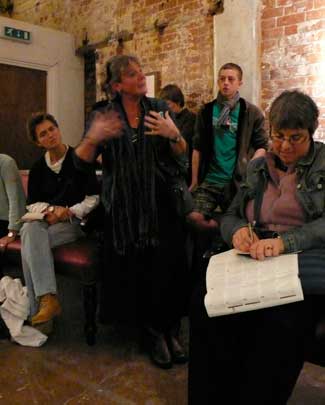I was lucky enough to attend the morning sessions of The Bigger Picture Festival of Interdependence in London over the weekend. Unfortunately we couldn’t get back in for the afternoon sessions as the queue for the event was, by this time, around the block. A great pity, but at least that meant that other people got to see it, not just the early birds like us!

The queue
The festival was put on (for free) by the New Economics Foundation. The festival was part conference, part workshop, part skill-share, and part exhibition all devoted to exploring the future of sustainability.
NEF’s choice of venue was inspired. Bargehouse is an 4-storey, gritty old warehouse space at the OXO Tower on the south side of the river. It was so lovely to be inside such a ‘human’ building instead of the usual polished concrete conference venue. It lent a really DIY activist vibe to the day.
I saw three talks. The first was a presentation from three speakers on the topic of food security and was introduced by NEF’s Andrew Simms. Of note was Tim Lang questioning what a sustainable diet looks like and how this fits in with our desire for a healthy diet. Lang asked can we have both? Lang says that it’s a fantasy that we have the right to choose what we eat, especially when it involves unsustainable transport and production processes (strawberries in winter, tropical fruit in the UK, etc).
Lang also introduced the audience to a new word deracination, which means lacking roots, to describe how the west has become so urbanized that we have lost touch with how to independently sustain ourselves through growing our own food. Another new term of Lang’s was the BINGO, that is a business that creates an NGO (non-government organisation).
Lang kept talking about a book by Tim Jackson called Prosperity without Growth that I will have to try and find at a library.

Tim Lang
Next up was the very interesting Professor Richard Wilkinson from Nottingham University talking about inequality. I could have listened to more of what he had to say, but unfortunately his presentation was brief. He showed by way of data graphics how countries that have a larger gap between the rich and poor have more social problems than countries where there is a more equality. Loss of trust, increased crime, and larger incarceration levels are some of the indicators of an unhappy and unequal society.
Wilkinson says that without trust a community loses the social cohesion that is fundamental to solving the problems of climate change. For, if we have no trust and no empathy for our fellow citizens, why would we bother doing something for them? The UK and Australia are at the top of the unequal scale so we have the most work to do in order to bring back the common good and stand any chance of solving the problem of climate change.
The last talk I saw was a discussion about the value of storytelling. My favourite speaker from this session was Lucy Neil, a theatre producer and an initiator of the Transition Town Tooting project. Neil told the story of her great great aunt Mary Neil. Mary started the Espérance Club in the late nineteenth-century for poor girls from the dressmaking trade. At the club she taught traditional English dances such as Morris dancing which were popular at the time. The girls were then able to travel throughout England teaching these dances and thereby earn a new income. Mary Neil saw dancing as an inclusive rather than exclusive past time. Lucy quoted her great great (and wise) aunt to finish the talk: “isolation is death, only in union is there life”, a great mantra for a sustainable future.
More photos on Flickr

Lucy Neil
Filed under: activism, environment, events, food, future, Festival of Interdependence, NEF, New Economics Foundation, The Bigger Picture




You must be logged in to post a comment.